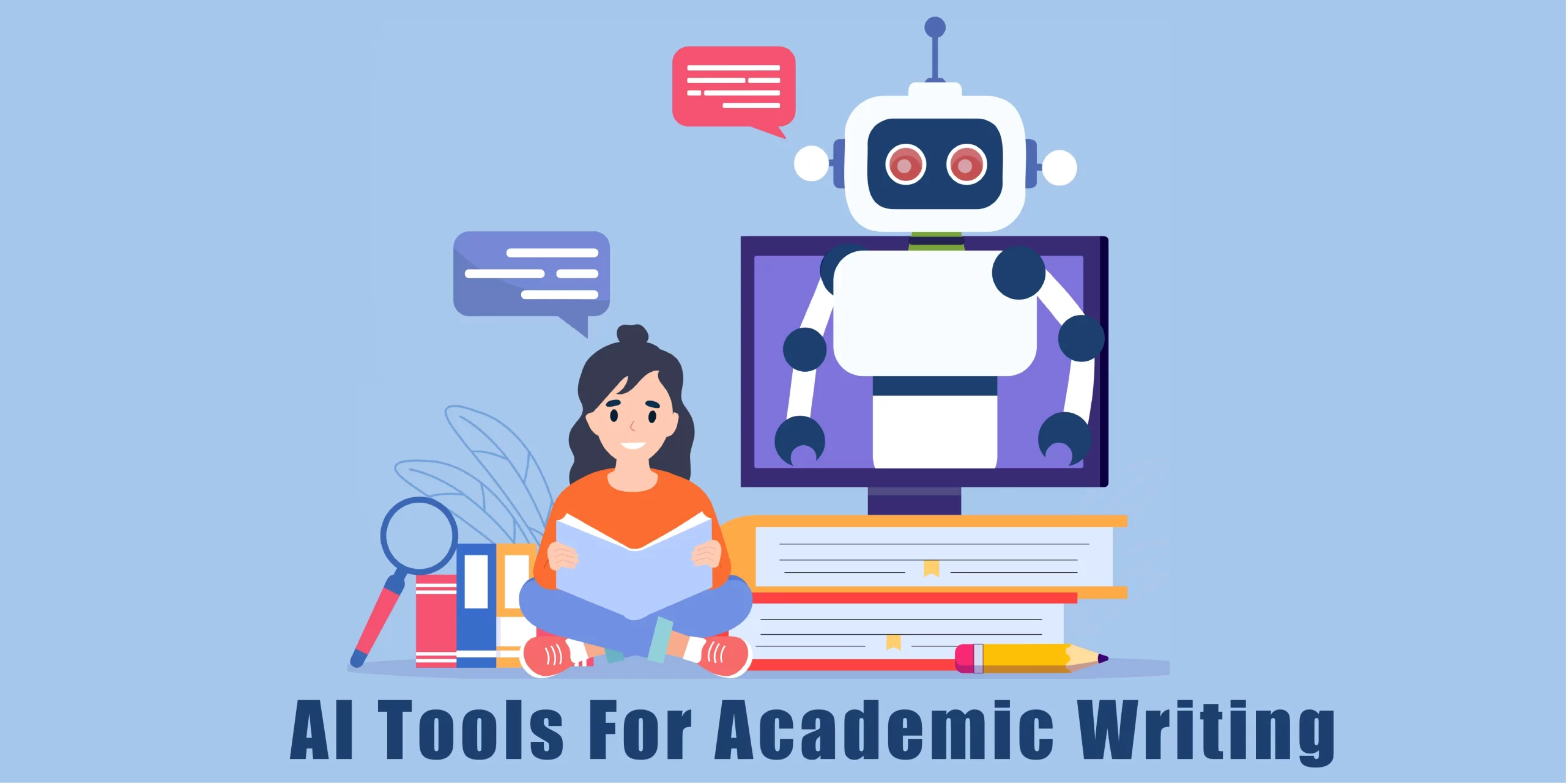Introduction
Academic writing, a pillar of intellect, undergoes a paradigm shift as Artificial Intelligence (AI) emerges. This convergence promises enhanced efficiency, precision, and productivity in scholarly endeavors. The rising influence of AI revolutionizes research, writing, and editing practices, reshaping the landscape of academic writing in 2024. This article aims to explore the top AI tools that bolster this indispensable field – an invaluable resource for those seeking to excel in their writing skills while embracing technology’s pervasive sway over academia. Brace yourself for a glimpse into the future of academic writing powered by cutting-edge AI tools that shape the narrative within this domain.
The Rise of AI Tools in Academic Writing
Artificial Intelligence has significantly reshaped the academic writing landscape in recent years. Its integration has not only improved the quality and speed of work but also deepened the research involved. Today, advanced AI tools offer an array of capabilities, including grammatical error correction, plagiarism checks, and even content generation.
The utilization of AI tools in academic writing is witnessing a clear and significant upward trend. Scholars, students, and researchers are increasingly recognizing the transformative potential of these tools. Market Research Future (MRFR) predicts that the global AI in Education market will reach approximately USD 23.82 billion by 2030, with a remarkable compound annual growth rate (CAGR) of 38% from 2024 to 2030. The rapid expansion is largely driven by the development of AI tools tailored specifically to assist in academic writing tasks.
This revolution marks an exciting era in which the realms of AI and academic writing seamlessly merge, offering a more efficient, effective, and captivating writing experience.
Importance of Choosing the Right AI Tool for Academic Writing
The appropriate utilization of AI tools can significantly enhance the quality of academic writing services, presenting a transformative opportunity for both students and researchers. With a wide array of AI tools accessible, making an informed choice becomes crucial. The right tool can streamline your writing process, rectify language errors and plagiarism issues, as well as provide constructive suggestions for improvement. Conversely, making an inadequate selection might result in subpar outcomes, wasted time, and unnecessary frustration. It’s akin to selecting a research method; employing a suitable tool can yield insightful results while using an unsuitable one can obscure your findings. Hence, comprehending your requirements and meticulously evaluating the available AI tools becomes indispensable in the pursuit of enhanced academic writing.
Top AI Tools for Academic Writing in 2024
In the realm of academic writing, staying updated with advancing technology is vital for achieving success. In 2024, AI tools have become indispensable for academic writers as they are specifically designed to enhance writing quality and efficiency. This article will help you explore the top five AI tools that are revolutionizing academic writing, making it more intuitive, precise, and engaging than ever before.
1. Grammarly:
As an academic writer, the accuracy of language holds immense importance. Grammarly has emerged as an indispensable AI tool for academic writing, providing a comprehensive package that encompasses spell check, grammar correction, and punctuation enhancement. Leveraging machine learning algorithms, Grammarly goes beyond being a simple grammar checker by offering suggestions to enhance tone, clarity, and engagement. It even includes a plagiarism detection feature to ensure the originality and integrity of your work.
2. Wordtune:
Wordtune utilizes AI technology to enhance the clarity and coherence of your writing. Serving as a personal writing coach, this tool refines your sentences by offering alternative phrases that make them more readable and engaging. It particularly benefits non-native English speakers, assisting in conveying ideas naturally and fluently.
3. JasperAI:
JasperAI deserves a special mention in the field of academic writing because it uses the latest AI technologies to create content that is both logical and contextually appropriate. It is of great help in the process of writing and revising academic papers by giving advice on the sentence structure, the tone, and the clarity. The JasperAI’s user-friendly interface and extensive database make it a trustworthy assistant for the researchers and students who want to create a perfect academic paper. Besides, it is useful in the reformulation of the content so that the risk of plagiarism is reduced and the writing process is improved.
4. PaperPal:
PaperPal is a complete writing assistant that is specially made for academic writers. It is the best in giving you the real-time feedback on grammar, style, and readability which will make your writing polished and professional. Among all the features of PaperPal, the most outstanding is its ability to give context-based suggestions depending on the type of academic document, be it a research paper, thesis, or dissertation. The individualized technique used by this writing program allows the writers to keep the academic standards and the clarity of their writing work all the time. Besides, PaperPal’s compatibility with the main writing platforms guarantees a smooth and fast writing process.
5. QuillBot:
QuillBot is a well-known for its advanced paraphrasing ability, which is very useful for academic writers to rephrase the content and still keep the original meaning. Its AI-driven algorithms offer various methods to rewrite sentences, thus elevating both the creativity and the versatility of writing. QuillBot also has the functions of grammar checking, plagiarism detection, and vocabulary enhancement, all of which combine to produce the high-quality academic content. QuillBot helps the writers to simplify the complex concepts and to make the writing more clear and therefore more convincing and original.
6. Rytr:
Rytr is an AI writing assistant that concentrates on producing high-quality academic content in a very efficient way. It helps writers by suggesting how to make the sentence better, more coherent, and more fluent. The main advantage of Rytr is that it can generate appropriate content in a context with only a small input, therefore it is perfect for the brainstorming and drafting phases. Also, the user-friendly interface of Rytr and its strong language model make academic writing both accurate and interesting. The fact that it can be used in any writing style and any discipline is the reason why it is a multi-purpose tool for both students and researchers.
Things to Consider when Choosing an AI Tool for Academic Writing
When selecting an AI tool for academic writing, it’s important to remember that there isn’t a universal solution. It requires careful consideration of various aspects. You should prioritize the tool’s proficiency in grammar and style checking. Additionally, look for features like AI detection, which help maintain the integrity of your work. Consider its ease of use and compatibility with your preferred writing platform as well. An AI tool that can adapt to different writing styles and offer personalized suggestions is truly valuable.
The AI tools, although they have some special features and abilities, are very dangerous to the academic writing. These tools can destroy the credibility of the academic work; thus, the writing process becomes less authentic and can even cause serious problems. Universities do not promote the use of AI for writing as it is the way of academic dishonesty and degree failure.
Turnitin and the like are the tools that can easily distinguish between the AI-generated text and the human-written one, hence, and the students who use such technology are in for a lot of trouble. Through these instruments, you put yourself in a position to lower the standard of your academic writing and thus face the academic consequences. AI in a wrong way can turn your work into a problem instead of a solution. Instead, seek expert help from the best academic writing services to ensure the authenticity and quality of your work.
The Future of Academic Writing with AI
AI and academic writing combine with great potential, as they pave the way for a promising future. In the pursuit of best writing services, AI has the potential to optimize the research and writing process, improve efficiency, and enhance the quality of output. Just imagine AI tools that autonomously conduct comprehensive literature reviews, generate drafts effortlessly, and predict future research trends based on available data. These groundbreaking advancements have the power to revolutionize academic writing by freeing up cognitive capacity for increased creativity and critical thinking. It’s a thrilling prospect that signifies a future where AI tools are not merely optional add-ons but integral components of the academic writing landscape.
Conclusion
AI is actively reshaping the landscape of academic writing, offering unparalleled efficiency, precision, and a vast array of resources. From the likes of JenniAI to Rytr, these indispensable tools redefine the entire writing process. As we embrace this transformative shift, choosing the right AI tool becomes crucial. With AI’s continuous evolution, we can eagerly anticipate even greater enhancements in academic writing—a future marked by a seamless integration of creativity and technology.









